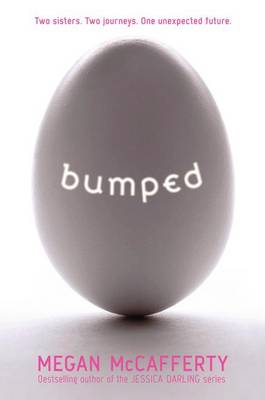Reviewed by Katie King on
Bumped is a reproductive dystopian, meaning it follows a society that through some hardship places quite the unhealthy emphasis on reproduction. Melody is a pregg-for-profit girl, offering up her uterus to whomever will pay the most. Harmony, a God-fearing, church-going Goodsider come to convince her sister to reform her sinful ways. And what we are meant to believe is that these two are identical twins. I just didn't really buy it. Harmony often comments on how she feels about her sister, but Melody refuses to even call her "sister." Melody even refers to the lack of any sort of bond she feels for her sister. Then at the end, they suddenly speak in unison and are laughing together like blissful best friends. I'm sorry, but that felt way too forced to me.
Speaking of forced, the mistaken identity plotline and subsequent...climax. So Harmony has completely broken free of sixteen years of purity teachings in 3 days? She is completely comfortable banging someone other than Ram (her betrothed) and wearing skintight, skimpy clothes? Yeah, try again. Especially since in the scenes following she acts almost just as uptight as she did in the very beginning before her "transformation." Another thing that felt forced was Jondoe's revelation at the very end of the story. Don't worry, he was "just pretending."
Other than all that, I did enjoy my second go around at Bumped. I love the society McCafferty has created, especially her lingo. While most of it is intuitive, there are a few words that took a little bit of thinking and page-flipping. The idea that teenagers sell their reproductive ability to couples desperate for children isn't really that hard to imagine. A society that is completely obsessed with this concept is, however. It penetrates their culture with such wide-sweeping influence, I would equate it to driving a car - almost everyone is doing it, and those who aren't wish they were.
I also thought this was a relatively female-friendly book. Yes, they girls need guys to "bump" (have sex) with in order to create these babies. Yes, girls get more money in their contract the more "perfect" they are. But the majority of characters are female, and portrayed with varying personalities. These girls do what they do in order to get ahead - to pay for college, to buy houses, to get married. Doing all this "bumping" is a stepping stone to get what they want. This is evident in the character of Shoko. She almost dies giving birth and she isn't really upset at all. She views it as at least she got two contracts fulfilled before she had to stop, because now she's a lot better off then she was before. It's sort of scary when you realize the near-death thing is totally NBD to her, but I can see her point. She's completely detached from it.
All in all, I am left with the feeling that I wish I knew more. I wish I knew more about Malia and what her current status was. I wish I knew about the time when the virus first happened and how it came about. I wish I knew more about Goodside and what living there is like. Bumped just isn't that kind of book, unfortunately. It builds the world necessary for our main characters to function, not to provide an accurate and in-depth account of the virus and cultural statistics. Maybe the sequel, Thumped, will provide that. Maybe it won't. I think what we have got is the best we could expect.
Summary
Bumped is a refreshing dystopian - no paranormal or fantasy overtones here. Similarly to The Handmaid's Tale, it is fully focused on reproduction in a society where not everyone has that luxury. I like the concept, the world, and all the slang. The relationships were okay, but felt a little forced at times. Sometimes you are told what to feel instead of shown what to feel. Whenever a character would try to break out of their one-sidedness, it felt forced. Not ground-breaking, but not by any means hard to read.
Reading updates
- Started reading
- 8 June, 2014: Finished reading
- 8 June, 2014: Reviewed
- Started reading
- Finished reading
- 8 June, 2014: Reviewed
